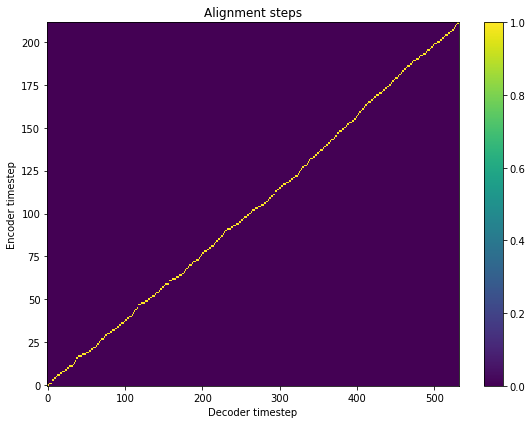Text-to-Speech GlowTTS Multispeakers
Contents
Text-to-Speech GlowTTS Multispeakers#
GlowTTS, Text to Melspectrogram.
This tutorial is available as an IPython notebook at malaya-speech/example/tts-glowtts-multispeaker.
This module is not language independent, so it not save to use on different languages. Pretrained models trained on hyperlocal languages.
This is an application of malaya-speech Pipeline, read more about malaya-speech Pipeline at malaya-speech/example/pipeline.
[1]:
import malaya_speech
import numpy as np
from malaya_speech import Pipeline
import matplotlib.pyplot as plt
import IPython.display as ipd
GlowTTS Multispeakers description#
Malaya-speech GlowTTS will generate melspectrogram with feature size 80.
Use Malaya-speech vocoder to convert melspectrogram to waveform.
Able to accept any speaker in 16k wav format for input speaker and do voice conversion for target speaker.
List available GlowTTS#
[2]:
malaya_speech.tts.available_glowtts()
[2]:
| Size (MB) | Quantized Size (MB) | Understand punctuation | Is lowercase | |
|---|---|---|---|---|
| male | 119 | 27.6 | True | True |
| female | 119 | 27.6 | True | True |
| haqkiem | 119 | 27.6 | True | True |
| female-singlish | 119 | 27.6 | True | True |
| yasmin | 119 | 27.6 | True | False |
| osman | 119 | 27.6 | True | False |
| multispeaker | 404 | 79.9 | True | True |
haqkiem voice contributed by Haqkiem Hamdan, recorded using high-end microphone in an audio studio.
female-singlish voice contributed by SG National Speech Corpus, recorded using high-end microphone in an audio studio.
Load GlowTTS model#
Fastspeech2 use text normalizer from Malaya, https://malaya.readthedocs.io/en/latest/load-normalizer.html#Load-normalizer,
Make sure you install Malaya version > 4.0 to make it works, to get better speech synthesis, make sure Malaya version > 4.9.1,
pip install malaya -U
def glowtts(model: str = 'male',
quantized: bool = False,
pad_to: int = 2,
**kwargs):
"""
Load GlowTTS TTS model.
Parameters
----------
model : str, optional (default='male')
Model architecture supported. Allowed values:
* ``'female'`` - GlowTTS trained on female voice.
* ``'male'`` - GlowTTS trained on male voice.
* ``'haqkiem'`` - GlowTTS trained on Haqkiem voice, https://www.linkedin.com/in/haqkiem-daim/
* ``'female-singlish'`` - GlowTTS trained on female Singlish voice, https://www.imda.gov.sg/programme-listing/digital-services-lab/national-speech-corpus
* ``'multispeaker'`` - Multispeaker GlowTTS trained on male, female, husein and haqkiem voices, also able to do voice conversion.
quantized : bool, optional (default=False)
if True, will load 8-bit quantized model.
Quantized model not necessary faster, totally depends on the machine.
pad_to : int, optional (default=2)
size of pad character with 0. Increase can stable up prediction on short sentence, we trained on 2.
Returns
-------
result : malaya_speech.model.tf.GlowTTS class
"""
[3]:
multispeaker = malaya_speech.tts.glowtts(model = 'multispeaker')
INFO:root:running speaker-vector/vggvox-v2 using device /device:CPU:0
INFO:root:running tts/glowtts-multispeaker using device /device:CPU:0
[4]:
# https://www.sinarharian.com.my/article/115216/BERITA/Politik/Syed-Saddiq-pertahan-Dr-Mahathir
string1 = 'Syed Saddiq berkata, mereka seharusnya mengingati bahawa semasa menjadi Perdana Menteri Pakatan Harapan (PH), Dr Mahathir telah melantik ramai di kalangan menteri dan timbalan menteri daripada golongan muda.'
Predict#
def predict(
self,
string,
audio,
temperature: float = 0.3333,
length_ratio: float = 1.0,
**kwargs,
):
"""
Change string to Mel.
Parameters
----------
string: str
audio: np.array
np.array or malaya_speech.model.frame.Frame, must in 16k format.
We only trained on `female`, `male`, `husein` and `haqkiem` speakers.
temperature: float, optional (default=0.3333)
Decoder model trying to decode with encoder(text) + random.normal() * temperature.
length_ratio: float, optional (default=1.0)
Increase this variable will increase time voice generated.
Returns
-------
result: Dict[string, ids, alignment, universal-output]
"""
It only able to predict 1 text for single feed-forward.
[5]:
female, _ = malaya_speech.load('speech/example-speaker/female.wav')
haqkiem, _ = malaya_speech.load('speech/example-speaker/haqkiem.wav')
khalil, _ = malaya_speech.load('speech/example-speaker/khalil-nooh.wav')
muhyiddin, _ = malaya_speech.load('speech/example-speaker/muhyiddin-yassin.wav')
[6]:
r = multispeaker.predict(string1, female)
[8]:
fig = plt.figure(figsize=(10, 8))
ax1 = fig.add_subplot(311)
ax1.set_title('Predicted Mel-Spectrogram')
im = ax1.imshow(np.rot90(r['universal-output']), aspect='auto', interpolation='none')
fig.colorbar(mappable=im, shrink=0.65, orientation='horizontal', ax=ax1)
plt.show()

[9]:
fig = plt.figure(figsize=(8, 6))
ax = fig.add_subplot(111)
ax.set_title('Alignment steps')
im = ax.imshow(
r['alignment'],
aspect='auto',
origin='lower',
interpolation='none')
fig.colorbar(im, ax=ax)
xlabel = 'Decoder timestep'
plt.xlabel(xlabel)
plt.ylabel('Encoder timestep')
plt.tight_layout()
plt.show()

Load Vocoder model#
There are 2 ways to synthesize melspectrogram output from TTS models,
If you are going to use individual speaker vocoder, make sure the speakers are the same If use female tacotron2, need to use female MelGAN also. Use
postnet-outputfrom TTS model. Read more at https://malaya-speech.readthedocs.io/en/latest/load-vocoder.htmlIf you are going to use universal MelGAN, use
universal-outputfrom TTS model. Read more at https://malaya-speech.readthedocs.io/en/latest/load-universal-melgan.html
We prefer individual speaker vocoder, size only 17MB and faster than universal vocoder.
[10]:
universal_melgan = malaya_speech.vocoder.melgan(model = 'universal-1024')
INFO:root:running vocoder-melgan/universal-1024 using device /device:CPU:0
[11]:
y_ = universal_melgan(r['universal-output'])
ipd.Audio(y_, rate = 22050)
[11]:
Voice Conversion#
def voice_conversion(self, string, original_audio, target_audio,
temperature: float = 0.3333,
length_ratio: float = 1.0,
**kwargs,):
"""
Change string to Mel.
Parameters
----------
string: str
original_audio: np.array
original speaker to encode speaking style, must in 16k format.
target_audio: np.array
target speaker to follow speaking style from `original_audio`, must in 16k format.
temperature: float, optional (default=0.3333)
Decoder model trying to decode with encoder(text) + random.normal() * temperature.
length_ratio: float, optional (default=1.0)
Increase this variable will increase time voice generated.
Returns
-------
result: Dict[string, ids, alignment, universal-output]
"""
[15]:
r = multispeaker.voice_conversion(string1, female, haqkiem, length_ratio = 1.2)
y_ = universal_melgan(r['universal-output'])
ipd.Audio(y_, rate = 22050)
[15]:
[ ]:
r = multispeaker.voice_conversion(string1, haqkiem, khalil, length_ratio = 1.2)
y_ = universal_melgan(r['universal-output'])
ipd.Audio(y_, rate = 22050)
